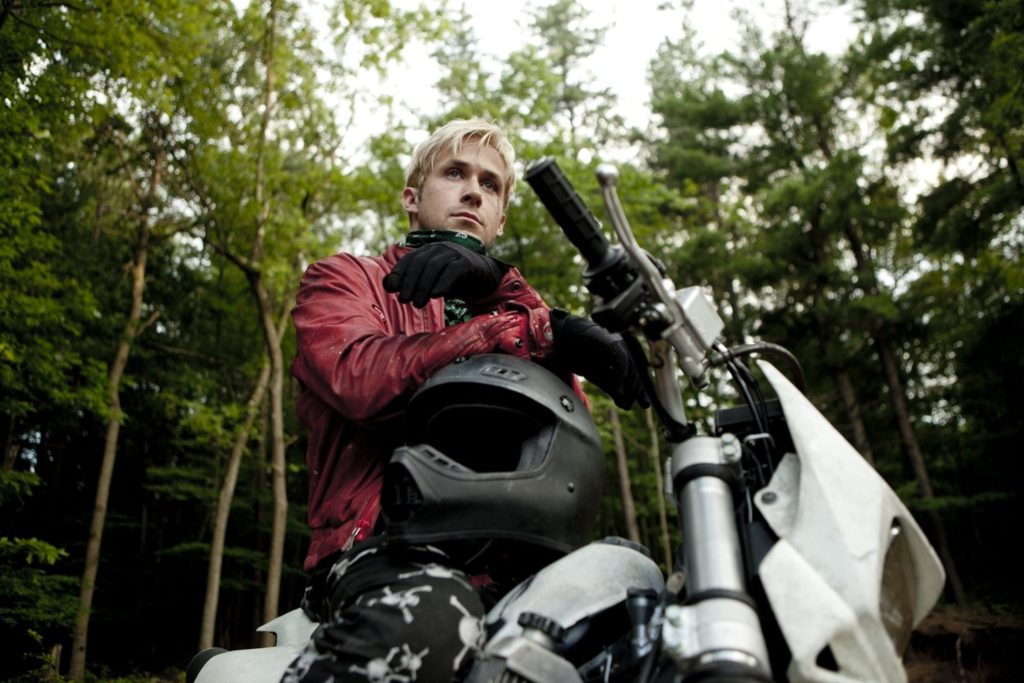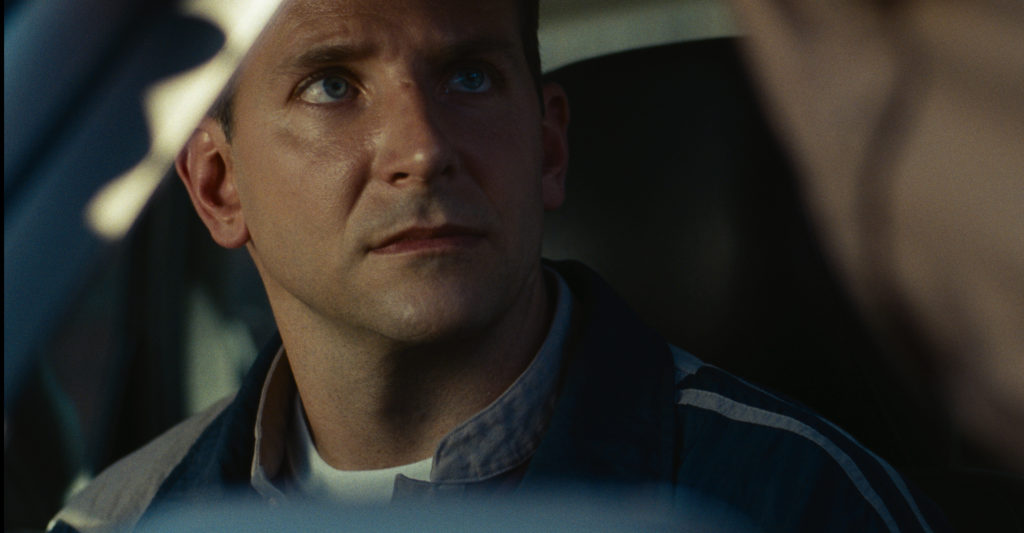An Ambitious Beauty Lost In Its Own Woods
DIRECTED BY DEREK CIANOFRANCE/2013
 The Place Beyond the Pines is a beautiful mess of a film in three distinct acts, each more frustrating, but no less beautiful, than the last.
The Place Beyond the Pines is a beautiful mess of a film in three distinct acts, each more frustrating, but no less beautiful, than the last.
Pines begins where any good film should: a long tracking shot of a death-defying motorcycle stunt show. Luke (Ryan Gosling) is the star cyclist. He’s crowned with bleached blond hair, tattoos crawl around his arms and cigarettes feel quite at home in his calm smirk. He reeks of cool, but he probably just reeks too. Making his way through Schenectady, NY, a regular stop on the carnival tour, Luke runs into an old flame, Romina (Eva Mendes), who has a surprise for him: a blonde-haired, blue-eyed bouncing baby boy named Jason. Just one moment with his son makes Luke turn on a dime; he ditches the carny circuit and sets up shop in Schenectady, inspired to be a present and providing father, unlike his own. Trouble is there’s not much work for stunt drivers in Schenectady. With newfound friend Robin (Ben Mendelsohn), Luke engages in a string of motorcycle-themed bank robberies, each escalating in risk, culminating in a breathtaking chase through a cemetery. Luke’s misguided ambitions will echo throughout his generations.
“Pines” story is more driven by its themes of fatherhood and destiny than by its characters—50 speaking roles in 140 minutes—which leads characters to do curious things in service to those themes. By the end credits, we’re not sure who we were supposed to be cheering for or if anyone really won or lost.
Before Pines becomes too reminiscent of the Gosling vehicle Drive, we’re abruptly transported to the next act. Here Avery Cross (Bradley Cooper), a naïve cop recovering from a gunshot wound, has father issues as well, finding distance between himself and his baby boy AJ. Avery’s family dinner is interrupted by a visit from his jocular cohort led by Det. Deluca (Ray Liotta). At the first hint of Liotta’s reptilian smile you know the good ol’ Schenectady PD has “covert ops” behind closed doors. Avery finds himself in a predicament that forces him to mature—and in many ways rot—in order to achieve mangled justice. Avery’s ambitions will echo as well.
This gives way to the film’s final act, which concentrates on Avery’s and Luke’s sons fifteen years later. AJ (Emory Cohen), a meathead and spoiled brat of the worst variety, serendipitously befriends the pliable Jason (Dane DeHaan), a “loner stoner” whose pallid face and gaunt frame belie his hunky stock. Each has no idea who the other’s father is or the shared history between them, setting up a dramatic irony that resolves in ways intended to remind us of those poor decisions made a generation prior.

The first act of The Place Beyond the Pines features its most engaging elements—in other words, Ryan Gosling on a sweet motorcycle.
The Place Beyond the Pines attempts to illustrate how the morally ambiguous acts of the past produce the clear evils of the present. In Blue Valentine, director Derek Cianfrance creatively weaved a love story that played with cause and effect in a similar way. Cianfrance loves to speak through inarticulate characters. He makes the simple nod and smile of an unhappy housewife speak with the weight of a soliloquy. The scriptwriters (Derek Cianfrance, Ben Coccio, and Darius Marder) know how muddled and indirect most of life’s important conversations are. The beauty of the film cannot be denied either. It is effortlessly stylish and swift. Together with a soundtrack that ranges from Arvo Pärt to Hall & Oates, Pines is often mesmerizing to the point of elation.
Pines story is more driven by its themes of fatherhood and destiny than by its characters—50 speaking roles in 140 minutes—which leads characters to do curious things in service to those themes. By the end credits, we’re not sure who we were supposed to be cheering for or if anyone really won or lost. Perhaps that’s the point and Derek Cianfrance auteur vision can be lauded in spite of its flaws. But it seems more like symptoms of an overly ambitious, bloated script (there were 37 drafts and it shows). Pines could work as a trilogy, which would be no less excessive, but maybe more enjoyable.

Digital effects were used to baby up Bradley Cooper’s face.
Ryan Gosling and Ben Mendelsohn offer the two most sympathetic performances in the energetic and spontaneous bank heist panel of Pines. These opening scenes are masterfully balanced with the understated family drama that Cianfrance is just so good at. But all of those things disappear for the second and third acts. The crime-drama scandal that Bradley Cooper is obligated to unravel is neither exciting nor dramatic; it makes the first portion of the film seem like the MacGuffin to a police procedural. The third act is mired in teen melodrama that makes you want to punch Emory Cohen’s snotty, muscle-bound AJ in the face—he makes The Situation look like The Dalai Lama. At least AJ being a despicable toad is believable. But why is Jason, who has been raised by attentive, sincere parents and has no recollection of his real father’s sins, such a screw up? Add to that lackluster fifteen-years-later makeup effects and a requisite “doing research on the internet” scene—there is just no way to film those well—and the final act stumbles into an unsatisfying coda.
The Place Beyond the Pines deserves praise for its creativity and moments of bliss, but it has more ambition than its runtime can bear. It is already being called a masterpiece, but I imagine that Derek Cianfrance has his best films yet in store for us.

